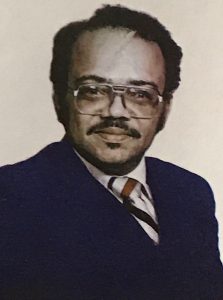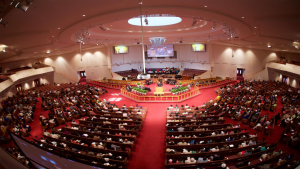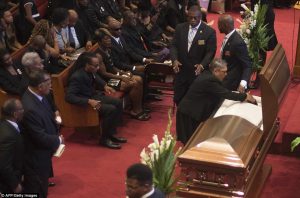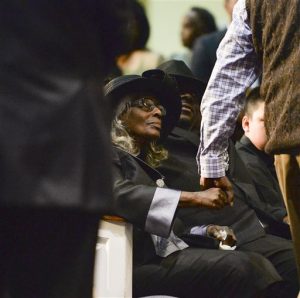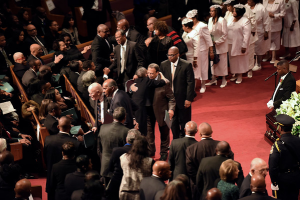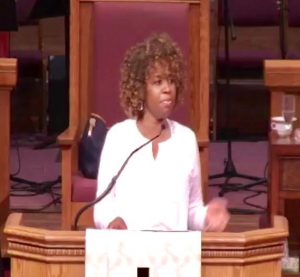Introduction
My brother Eric was the oldest of eight children. Considered one of the smartest boys in our county, he skipped two grades in school and graduated early. Attending such a prestigious college as Morehouse was quite an honor for someone from my little rural community in South Georgia. Regrettably, he did not graduate from Morehouse. Nevertheless, he still remained my role model. Because I did not grow up with a father, Eric was the closest father figure that I had. During my senior year in high school, Eric, of his own accord, gave me a car. In doing so, he told me that he was pleased that I had been conscientious and responsible enough in securing a part-time job at the local grocery store. Eric was the first person, besides my mother and grandmother, who openly acknowledged my accomplishments and encouraged my college pursuits.
Unfortunately, February 13, 2013, is a day forever etched in my memory. On that day, I received an unforgettable phone call from one of my sisters. She reluctantly shared with me that my big brother had passed away. He was only 65. After nearly fainting from the news, I then began to process this traumatic information and prepare for the Homegoing, which was to take place in my provincial hometown of Quitman, Georgia, where Eric had relocated after concluding his business dealings in Washington. My mother and eldest sister oversaw most of the arrangements. The current pastor of my home church, Bethel African Methodist Episcopal (AME), was asked to deliver the eulogy. I was asked to read an Old Testament scripture of my choosing for the service. Through tears and sobs I read, “For I know that my Redeemer lives, and at the last he will stand upon the earth, and after my skin has been thus destroyed, then in my flesh I shall see God, whom I shall see on my side, and my eyes shall behold, and not another. My heart faints within me.”[1] This scripture provided comfort and reassurance that the day of my brother’s burial was not the last day of his life. Job, like my brother, had gone through tumultuous times in his life; yet, “these verses express the sufferer’s confidence that a kinsman will step forward and perform the necessary actions to afford Job justification in death.”[2] Because of Jesus, our Redeemer, death did not have victory over my brother’s life. This truth sustained me throughout the turbulent days, weeks, and months ahead.
|
|
The Problem
During my brother’s Homegoing service, I detected an uneasiness that is rather difficult to articulate. I perceived that something was being forced upon me. I sensed that I had to be strong and put forth a joyous, upbeat countenance. I did not believe that I could pour out my heart in inconsolable grief for my brother. Why did I feel that way? After all, I am a Christian and a minister of the Gospel. If anyone should be full of praise, it should be me. Shouldn’t it? Not only was this an uneasiness I experienced as a bereaved family member, but other parishioners at my current church evidently felt this uneasiness as well.
Saint Philip AME Church in Context
One aspect of pastoral care at Saint Philip AME Church is assisting families in the planning and preparation of Homegoing Services. After meeting with families in my pastoral care role and attending a number of funerals, I became concerned with the disconnection between the loss of a loved one and the Homegoing service. Whether I was present after a loved one had been rushed to the hospital or asked to be present in the final moments of a loved one’s transition, the amount of sorrow and anguish these families experienced was palpable. Sadly, the Homegoings, for the most part, were filled with praise and adulation and displayed little evidence of lament. This improper balance concerned me deeply because the Homegoing should be a service in which grief and loss are expressed as often as praise and adulation. Thus, it is essential for eulogists to assist their congregants by allowing space for both lament and celebration.
To prepare Homegoing services that will effectively minister to the needs of bereaved parishioners, the eulogist must understand Homegoing’s cultural heritage. This service is characterized by ambivalent feelings and grief as well as an individual and communal lament over the plight of the African American community. By developing ministers appropriately, rethinking the liturgy, and recovering lament and celebration, the eulogist can assist in a Homegoing that typifies an incarnational theology of death.
Understanding the Heritage of Homegoings
In a religious context, the term Homegoing refers to the deceased’s “going home” to be with the Lord in heaven. This Christian based service, most commonly held in a chapel or church where the deceased is usually buried in an affiliated cemetery, gives families an opportunity to celebrate the life of their loved one. Juan Floyd-Thomas in Liberating Black Church History: Making it Plain postulates, “It was only once the Black preacher officially preached the funeral sermon over the dead that the family and larger community could fully enjoy peace of mind in the knowledge that the spirit of the deceased was truly set free.”[3] Thus, the eulogist plays an important role in aiding families who believe that their loved ones will be resurrected to rest eternally in the bosom of Jesus.
The Homegoing funeral ritual has its origins in Ancient Egypt, where the people held a rich culture of preparing for a funeral and preserving the deceased for his/her after-life.[4] This precious legacy was continued in the United States by enslaved persons who were not permitted to gather and conduct their funeral rituals because slaveholders feared that they would conspire to revolt. Slaves who died were ordinarily buried without any ceremony in unmarked graves in non-agricultural ground. Ironically, when a member of the plantation owner’s family died, the enslaved persons were responsible for funeral preparations as well as the elaborate family gatherings held to mourn the deceased.[5] Being forced to bury someone else’s loved ones when one cannot even afford to weep over one’s own is the height of hypocrisy. To exacerbate matters, enslaved persons often died at the hands of a savage overseer, meaning that their loved ones could not voice their rage or indignation. As a result, Homegoings became a way for enslaved persons to preserve their heritage, defy slavery’s cruel machinations, and gain liberty that slavery had inhumanely denied them in this life. Even though slavery in the United States ended 156 years ago, its vestiges remain prevalent in society today.
Rituals and Ambivalent Feelings
The Homegoing is a ritual that helps maintain order and offer structure to our lives. They also help us analyze the ambivalent feelings that sometimes conflict with our experiences. “One of the greatest threats to order, meaning, and community in human life is the disruptive effect of ambivalent feelings…Theologically speaking…ambivalence is not in and of itself sin, but rather a part of the created complexity of the human psyche.”[6] Not knowing exactly how to feel when one’s loved one is no longer in pain yet no longer living is difficult. Should they rejoice that their loved ones are no longer suffering, or should they grieve that their loved ones are gone? These contradictory feelings can be difficult to handle alone. With the proper Homegoing, however, these ambivalent feelings can be addressed. Ramshaw in Ritual and Pastoral Care believes rituals help us cope with ambivalence in two crucial ways: “The first is by reinforcement of the preferred emotion; the second is by contained expression of the unwanted, conflicting emotion.”[7] Homegoings as they are currently practiced typify the first ritual method more than the second. The celebratory timbre of Homegoings becomes the focal point. The loud music and the uproarious eulogy both contribute to an insincere ritual. However, “the second ritual method for handling ambivalence is to provide a safe mode of expression for the conflicting emotions. This method is dependent upon the first, for expressing negative feelings can only be safe against the backdrop of the ritually established continuity of the positive.”[8] Sadly, the predominant ethos among most eulogists is to encourage family, friends, and loved ones to ignore their feelings of sorrow and despair and immediately celebrate the life of the deceased without acknowledging their significant loss. When one enters the worship space, no matter the occasion, one should expect ritual honesty, not ritual dishonesty.
Acknowledging Grief
The eulogist is not the only one responsible for a thorough understanding of eulogies but initially does bear most of the burden. As Peter Wherry believes, “The …eulogy, then, becomes [an] exercise in healing homiletics, as well as didactic and transformative between the church and the wider community.”[9] Exploring the subject of grief and how Christians grieve is a crucial component of this dialogue. By educating the congregation, eulogists can demystify the assumption that Christians do not grieve, especially during the Homegoing service. When done correctly, the Homegoing service is the perfect place to grieve.
Individual Lament
As a regular eulogist at Saint Philip’s Homegoings, I encourage parishioners to express their emotions. I usually begin by announcing, “There will be times during the service when you feel like crying, and you should by all means cry.” This affirmation of the acceptability of crying was met with deep appreciation from one member after a Homegoing. With tears in her eyes, she personally thanked me and stated how those words allowed her to cry profusely. Her reaction sparked within me a need to assess the prevailing message that compels parishioners to shy away from crying during a Homegoing service.
Communal Lament
Being able to lament in the midst of the Homegoing service is paramount and essential. Sadly, congregants are often told not to display their true emotions and to “be strong” and have a “stiff upper lip.” These faulty admonitions force dissembling and impede healthy processing of our grief. W. Derek Suderman in “The Cost of Losing Lament for the Community of Faith: On Brueggemann, Ecclesiology, and the Social Audience of Prayer” focuses on the consequence of lament for the congregation. He reiterates how Brueggemann wrote of lament and primarily focused on how it affects the individual and the individual’s relationship with God. However, Suderman concludes that lament affords the entire congregation an opportunity to lament which binds the community of faith together. “The language of lament provides a hermeneutical irritant that prompts discernment and invites – even demands – a response from its listeners.”[10] Communal lament is integral to our mental and emotional health and strengthens our faith.
Communal Plight
The unsettling jubilant nature of these Homegoings stands in stark contrast to the hardships that plague the African-American community. Senseless deaths in marginalized communities continue to be a source of consternation surrounding death. Although Black Churches are not monolithic, high-spirited Homegoing services are typical. Their celebratory nature can seem rather formulaic and rudimentary with little, if any, regard for precious and insurmountable loss. Awareness of the plight of many urban areas and rural communities should help churches meet the needs of their parishioners, but lacking this awareness does just the opposite. Current African American health disparities indicate African-Americans are:
44% more likely to die from a stroke, 40% more likely to die from breast cancer, 52% more likely to die from cervical cancer, … 3 times more likely to die from asthma, 25% more likely to die from heart disease, … 3 times as likely to die from a pregnancy related complication, 2 times as likely to die from prostate cancer, 8 times as likely to be diagnosed with HIV, 9 times as likely to die from HIV, [and] 72% more likely to die from diabetes.”[11]
Unfortunately, even more troubling statistics plague our children. African American children are “2.5 times more likely to die as infants, 2 times as likely to die of Sudden Infant Death Syndrome (SIDS) …and 61% more likely to attempt suicide in high school.”[12] Consequently, many African American communities are enshrouded by grief and loss, which churches cannot avoid addressing.
Preaching and the Power of Lament
People often overlook the power inherent in lament as it gives credence to the struggles many face on a daily basis. Richard Dillon, in “The Unavoidable Discomforts of Preaching about Death,” acknowledges that death is a difficult topic to preach but gives biblical examples of the necessity of doing so.
If Christian preaching and Christian worship are held accountable to the Bible, it is difficult to see how they can administer anesthesia for that last appointment of Everyman. The one strikingly clear trait of all biblical discourse about death is its unblinking realism in accepting death as the corollary of creaturely life, the dispensation of life’s Creator and the sign of unqualified human subjection to him.[13]
Death is not omniscient and cannot be allowed to exaggerate its purpose here on Earth and convince people, particularly believers, of an omnipotence it does not possess. Many have allowed death to become this looming figure but Jesus has placed everything under His feet.[14] Death, hell, and the grave are all subject to Jesus and have no power over Jesus or believers.
In an effort to assist ministers at Saint Philip in understanding the importance of ministry, our pastor teaches hour-long monthly ministers’ sessions. One particular lesson he taught was called “Preaching the Eulogy.” Pastor Watley began the meeting by expressing the need for all ministers to have a better understanding of eulogies. His initial question “What is the Eulogy?” provided the focal point. After several ministers gave their definitions and explanations, he then gave his. According to his definition, the eulogy is a word of commendation and praise, particularly for someone who has died. In this same meeting, Pastor Watley discussed the purpose of the eulogy. He believes that the purpose of the eulogy is to comfort, encourage and empower the living and to help the living say goodbye to the deceased, who are in the hands of God.[15] Pastor Watley conferred a great deal of important information to us during that meeting, and his instruction has been a useful resource for the ministerial staff. The distinction some make between the eulogy and words of comfort could be combined in order to speak well of the deceased and speak life to the living. The two do not have to be mutually exclusive and both can be conveyed in a loving, caring manner.
Having the appropriate liturgy is sine qua non for a balanced Homegoing celebration. Simon Chan in Liturgical Theology: The Church as Worshipping Community affirms, “…to discover the shape of the liturgy, therefore, is to discover the true way of worship or the way of reorienting the church toward the Christian worldview.” [16] First, the liturgy during the Homegoing should offer appropriate space for lament. The current liturgy that is being utilized in the AME Church is rather esoteric and does not lend itself to space for lament.[17] For these reasons, I suggest the following changes to improve this liturgy and meet the needs of grieving families.
Initially, the wording of the liturgy in the AME Book of Worship only lists the word prayer. One can be more descriptive by using the phrase “Prayer of Intercession” as opposed to only the word “Prayer.” Christian liturgical traditions include several types of prayers, and the prayer notation should provide more direction for the faith community in a funeral setting. For example, in AME tradition, a minister is selected to pray extemporaneously during the Homegoing. A simple wording change can denote the way in which the prayer’s purpose is to minister to those assembled for the Homegoing in a deep, abiding way. The Prayer of Intercession is an opportunity for the minister to pray for those in attendance and beseech God to comfort them during their time of loss.
The Scripture heading in the liturgy is also vague. Biblical passages can be pre-selected to determine which scriptures are most appropriate. Presently, AME ministers select the scripture or give the family the option of selecting their own.
Regarding song selection, the music director speaks with the family and asks them which song they would like the choir to sing. The AME Church could offer a written guide to the family consisting of songs that would be appropriate for a Homegoing.
The term eulogy also does not adequately describe the words that will be used to minister to those in attendance. One suggestion is that in place of the term, Eulogy, one can use the wording, “Words of Comfort,” which would afford the congregants space to express their grief and sadness. These subtle changes in wording can begin the process of creating more space for lament within the service. With such minor changes to the liturgy, people would receive a more complete Homegoing program upon their arrival to the service that would transform the atmosphere and prepare hearts in advance for a Homegoing space cultivated for lament and celebration. Perhaps, these minor changes will assist with the flow of the service and allow it to become a more thoughtful space for lament.
The content of the eulogy itself is another aspect of the Homegoing that should be reconsidered to create space for expansive emotions of grief. I interviewed several AME pastors and ministers and asked about their perceptions of the eulogy in terms of celebration and lament.[18] They agreed that there needs to be space for lament and celebration. Rather than the preacher aiming solely on celebration, the content of the eulogy should also focus on helping the family and friends through their period of mourning and loss. The eulogy typically celebrates the life of the deceased person, but it can also shift to ways the life of the deceased person can help the living. As part of the eulogy, the pastor should remind congregants that grieving is not a sign that someone lacks faith but rather is an expression of love. Letting the congregation know that grieving is expected and even recommended would resonate with attendees.
Recovering Lament and Celebration
Celebration has been an unbalanced part in most Homegoings. Dwight Stevenson, in “Eleven Ways of Preaching a Non-Sermon,” speaks to the singular emphasis on celebration, indicating that “Such preaching sounds as though it has only one text: Wonderful Counselor, Mighty God, Everlasting Father, Prince of Peace. It is closely allied to … ‘the Jesus Stereotype’ – the problems of mankind concretely stated and painfully experienced, but nothing from the Christian side, but booming generalities – Jesus is the answer!”[19] Even in our remembrances of our loved ones, there are still often questions that remain unanswered because the eulogist chooses to forgo the Crucifixion and preach only of the Resurrection. By doing so, the eulogist diminishes the power inherent in the Crucifixion which makes the Resurrection possible. Had Jesus not died on the Cross, the Resurrection would not have occurred. Both the Crucifixion and the Resurrection are central to our Christian faith.
Homegoing celebrations should balance lament and celebration. This balance can be achieved first by changing the wording and tone of the liturgy by providing comfort for those attending the Homegoing service. Second, the Homegoing should acknowledge the absence of one who was loved and will be missed. Third, the content of the eulogy must shift from primarily praising God to nurturing a space that will hold the pain of mourners. Fourth, the pastor’s preaching should affirm that grief does not signify weak faith or a fractured belief system.
Homegoings have historically been heartfelt, but they need to offer a balance of lament and celebration. By offering guidance on the prayers, scriptures, and songs to be used in Homegoings, we can more easily help church members through challenging times in their lives. For example, I created a handout to assist bereaved families with planning for Homegoings and selecting scriptures and songs for these services.[20] Further, more attention can be given to the liturgy in order to consider the needs of the mourning community.
An innovation that has never been tried at Saint Philip, but might be if approved by my pastor, is to incorporate a post-service survey [21] after the Homegoing Services. This survey can help the Minister of Pastoral Care assess improvements for future Homegoings.
The Homegoing for a twenty-eight-year-old member of our congregation provides the foundation for future Homegoings that will balance lament and celebration. This young man came to Saint Philip as an employee and not a member. His work as a sound engineer was impeccable. God began to transform his heart, and one Sunday he left the sound table and walked to the front of the church to surrender his life to the Lord. More than his work ethic, we all admired him as a single father who lovingly doted on his two small children. He made sure they were at church every Sunday, and they attended Sunday School. His bout with lupus and leukemia cut his life short, but we were thankful for the brief time we had with him. His life had meaning. I shall never forget the day that his mother called and asked me to come to the hospital because he was nearing his mortal end. Surely, I thought I had misheard her. I traveled to the hospital and was there during his last breaths on Earth. His family had gathered around his bedside and kept telling him over and over through pain and anguish, “I love you. We love you.” It was the most beautiful experience I could have ever imagined. Their love for this young man touched my heart and reminded me that life is fleeting.
This experience accompanied me throughout the week as I prepared the eulogy. I wanted the service to be filled with lament and celebration. I chose the scriptural verse: No, in all these things we are more than conquerors through him who loved us.”[22] This passage spoke of the beauty of this young man’s life and God’s ability to conquer death, hell, and the grave. As I delivered the eulogy, I acknowledged the hurt we felt as a church family at not seeing him anymore and no longer fellowshipping with him. However, we also rejoiced in knowing that he was no longer in agony. The Homegoing reflected our belief that he was with Jesus. As various episodes of his life flashed across the screen during the video tribute, we were able to listen to the music and reflect upon his life. “I’m coming home, I’m coming home. Tell the world I’m coming home. Let the rain wash away. All the pain of yesterday. I know my kingdom awaits. And they’ve forgiven my mistakes. I’m coming home, I’m coming home. Tell the world I’m coming home.”[23] With these lyrics, we said good-bye to our friend and rested in the comforting knowledge that he was home.
2. Matthew Suriano. “Death, Disinheritance, and Job’s Kinsman-Redeemer.” Journal of Biblical Literature. 129, no.1, (January 1, 2010): 65.
3. Juan M. Floyd-Thomas, Liberating Black Church History: Making It Plain (Nashville: Abingdon Press, 2014), 49.
4. Sara J. Marsden, “Homegoing Funerals: An African-American Funeral Tradition,” March 5, 2013,
https://www.us-funerals.com/funeral-articles/homegoing-funerals.html
5. Ibid.
6. Elaine Ramshaw, Ritual and Pastoral Care, ed. Don S. Browning (Philadelphia: Fortress Press, 1987), 30.
7. Ramshaw, Ritual and Pastoral Care, 31.
8. Ibid., 31-32
9. Peter M. Wherry, Preaching Funerals in the Black Church: Bringing Perspective to Pain (Valley Forge: Judson Press 2013), 30.
10. Derek Suderman, “The Cost of Losing Lament for the Community of Faith: On Brueggemann, Ecclesiology, and the Social Audience of Prayer.” Journal of Theological Interpretation 6, no.2 (Spring, 2012): 215.
11. “African American Health Disparities Compared to Non-Hispanic Whites,” accessed February 21, 2019, https://www.familiesusa.org/product/african-american.html.
12. Ibid
13. Richard Dillon, “The Unavoidable Discomforts of Preaching about Death,” Worship 57, no. 6 (November 1983): 487.
14. Hebrews 2:8.
15. William D. Watley, “What is the Eulogy,” (lecture, Saint Philip AME Church, Atlanta, GA, May 17, 2017)
16. Simon Chan, Liturgical Theology: The Church as Worshipping Community (Downers Grove: InterVarsity Press, 2006), 62.
17. “The Order for Burial of the Dead,” Book of Worship of the African Methodist Episcopal Church (Nashville: AME Sunday School Union, 1984), 71.
18. See Appendix 2.
19. Dwight E. Stevenson, “Eleven Ways of Preaching a Non-Sermon” Lexington Theological Quarterly 10, no. 3 (July 1975): 25-26.
20. See Appendices 2 and 3.
21. See Appendix 4.
22. Romans 8:37
23. Diddy-Dirty Money with Skylar Grey, “Coming Home,” track 4 on Last Train to Paris, Bad Boy Music, 2010, compact disc.
Appendix 1
Survey
- What is the purpose of the eulogy?
- How do you prepare a eulogy?
- Is the eulogy different for believers than nonbelievers?
- Do you think that Homegoings have lost lament?
- Do you think there needs to be space for lament and grieving at the Homegoing?
- Why is there an emphasis on celebration during Homegoings?
- Does that emphasis detract from lament?
Appendix 2
Abbreviated List of Scripture Readings
Old Testament
Job 19:23-27
Psalm 23
Ecclesiastes 3:1-4
Isaiah 57:1-2
New Testament
Matthew 11:28-30
John 14:1-3
Romans 8:35, 37-39
2 Corinthians 1:3-4
Philippians 1:23-27
I Thessalonians 4:14-17
Revelation 21:1-7
Appendix 3
Abbreviated List of Hymn Selections
Amazing Grace
Blessed Assurance
Great Is Thy Faithfulness
Hold to God’s Unchanging Hand
How Great Thou Art
It Is Well, With My Soul
What A Friend We Have in Jesus
Appendix 4
Post Homegoing Survey
- What is the most memorable aspect of the service?
- What was most memorable upon your initial arrival at the church?
- During the service, were there any words or phrases that you did not understand?
- If you could change one thing about our service, what would it be?
- What is one thing you would have liked to have done that was not done?
- Was there anything we could have done to make things easier for you?

